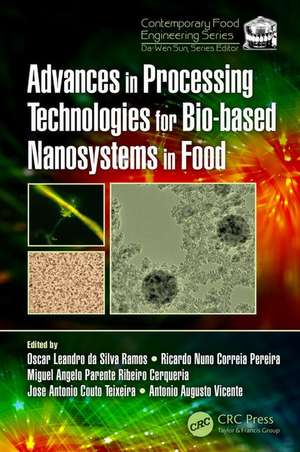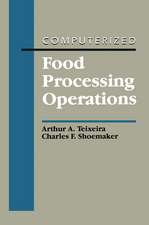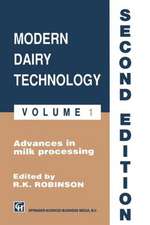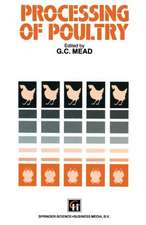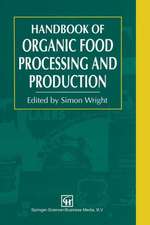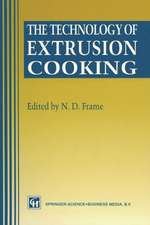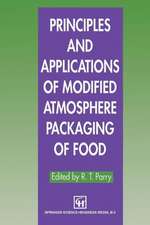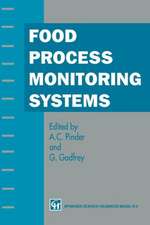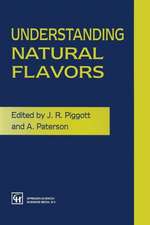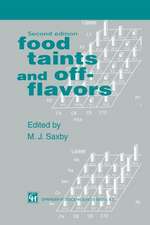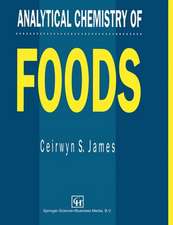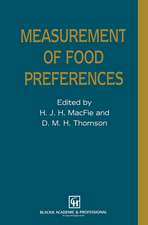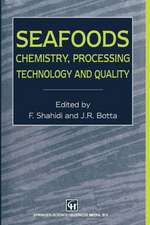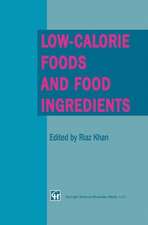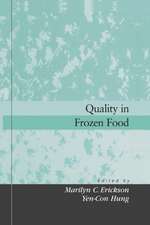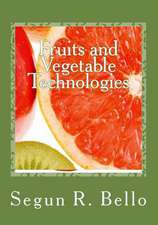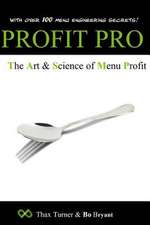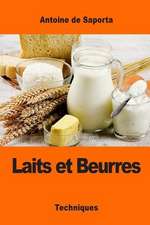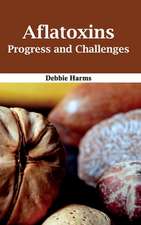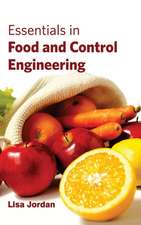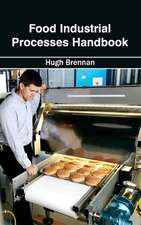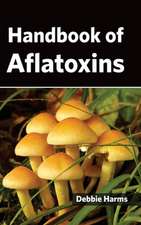Advances in Processing Technologies for Bio-based Nanosystems in Food: Contemporary Food Engineering
Editat de Óscar L. Ramos, Ricardo N. Pereira, Miguel A. Cerqueria, José A. Teixeira, António A. Vicenteen Limba Engleză Hardback – 9 aug 2019
Features:
- Presents the most recent advances made in the field of nanoscience and nanotechnology as applied to the food industry
- Discusses innovative approaches and processing technologies
- Shows how nanotechnology can be used to produce safer, nutritious, healthier, sustainable and environmental-friendly food products
- Covers the complex mechanisms involved in the research, development, production and legislation of food containing nanostructures
research and development in the food processing industry.
Din seria Contemporary Food Engineering
- 9%
 Preț: 694.92 lei
Preț: 694.92 lei - 24%
 Preț: 485.49 lei
Preț: 485.49 lei - 28%
 Preț: 1475.18 lei
Preț: 1475.18 lei - 18%
 Preț: 709.45 lei
Preț: 709.45 lei - 15%
 Preț: 669.94 lei
Preț: 669.94 lei - 28%
 Preț: 1363.02 lei
Preț: 1363.02 lei - 28%
 Preț: 993.44 lei
Preț: 993.44 lei - 18%
 Preț: 1834.06 lei
Preț: 1834.06 lei - 29%
 Preț: 1351.60 lei
Preț: 1351.60 lei - 15%
 Preț: 669.94 lei
Preț: 669.94 lei - 15%
 Preț: 540.06 lei
Preț: 540.06 lei - 27%
 Preț: 524.78 lei
Preț: 524.78 lei - 15%
 Preț: 500.33 lei
Preț: 500.33 lei -
 Preț: 455.78 lei
Preț: 455.78 lei - 18%
 Preț: 718.13 lei
Preț: 718.13 lei - 24%
 Preț: 476.05 lei
Preț: 476.05 lei - 9%
 Preț: 1355.15 lei
Preț: 1355.15 lei - 18%
 Preț: 700.75 lei
Preț: 700.75 lei - 18%
 Preț: 1359.95 lei
Preț: 1359.95 lei - 25%
 Preț: 552.60 lei
Preț: 552.60 lei - 29%
 Preț: 1101.89 lei
Preț: 1101.89 lei - 14%
 Preț: 2143.53 lei
Preț: 2143.53 lei - 25%
 Preț: 1112.81 lei
Preț: 1112.81 lei - 28%
 Preț: 1045.74 lei
Preț: 1045.74 lei - 18%
 Preț: 705.50 lei
Preț: 705.50 lei - 18%
 Preț: 1346.58 lei
Preț: 1346.58 lei - 28%
 Preț: 989.77 lei
Preț: 989.77 lei - 18%
 Preț: 1256.42 lei
Preț: 1256.42 lei - 18%
 Preț: 1671.73 lei
Preț: 1671.73 lei - 30%
 Preț: 935.69 lei
Preț: 935.69 lei - 18%
 Preț: 1277.90 lei
Preț: 1277.90 lei - 31%
 Preț: 1850.48 lei
Preț: 1850.48 lei - 29%
 Preț: 1246.37 lei
Preț: 1246.37 lei - 18%
 Preț: 1815.14 lei
Preț: 1815.14 lei - 25%
 Preț: 473.94 lei
Preț: 473.94 lei - 28%
 Preț: 987.72 lei
Preț: 987.72 lei - 28%
 Preț: 1415.04 lei
Preț: 1415.04 lei - 29%
 Preț: 1184.60 lei
Preț: 1184.60 lei - 28%
 Preț: 1413.83 lei
Preț: 1413.83 lei - 29%
 Preț: 1239.41 lei
Preț: 1239.41 lei
Preț: 1336.32 lei
Preț vechi: 1629.66 lei
-18% Nou
Puncte Express: 2004
Preț estimativ în valută:
255.79€ • 277.93$ • 214.100£
255.79€ • 277.93$ • 214.100£
Carte tipărită la comandă
Livrare economică 21 aprilie-05 mai
Preluare comenzi: 021 569.72.76
Specificații
ISBN-13: 9781138037304
ISBN-10: 1138037303
Pagini: 396
Ilustrații: 16 Tables, black and white; 52 Illustrations, black and white
Dimensiuni: 156 x 234 x 28 mm
Greutate: 0.72 kg
Ediția:1
Editura: CRC Press
Colecția CRC Press
Seria Contemporary Food Engineering
ISBN-10: 1138037303
Pagini: 396
Ilustrații: 16 Tables, black and white; 52 Illustrations, black and white
Dimensiuni: 156 x 234 x 28 mm
Greutate: 0.72 kg
Ediția:1
Editura: CRC Press
Colecția CRC Press
Seria Contemporary Food Engineering
Public țintă
Professional ReferenceCuprins
Overview. General introduction. Production and Characterization of Bio-nanosystems Focusing Emerging Processing Technologies. NanoHydrogels production. NanoParticles/NanoCapsules production. Lipid-based Nanosystems production (i.e.Nanoelmulsions, Solid Lipid Nanoparticles (SLN) and Nanostructured Lipid Carriers (NLC). NanoLaminated systems Production. Bio-nanosystems resorting to electrospinning. Bio-nanosystems Characterization. Evaluation of Bio-nanosystems Behavior Containing Bioactive Compounds. Delivery systems: Improving food quality, safety and potential health benefits. Uptake and digestion. Toxicological (in vivo, in vitro assays), resistance and shelf-life studies. Applications in food industry. Nanotechnology in food packaging. Nanotechnology in food processing. Nanotechnology in food preservation. Industrial benefits/Scale-up. Risk, Regulation and Consumer Perception. Advanced Methods for Detection of Nanosystems in Foods. Legal and ethical issues/Risk assessment in the food chain. Public acceptance/Consumer attitudes. New research trends/Future perspective/Recent advances.
Notă biografică
Óscar Leandro da Silva Ramos earned a BSc in Microbiology from the Portuguese Catholic University, Porto, Portugal, and a PhD in Technological and Engineering Sciences with a specialization in Biochemical Engineering from the New University of Lisbon, Lisboa, Portugal. He is now a postdoctoral researcher at the Centre for Biological Engineering (CEB) of Minho University, Braga, Portugal, and at the Department of Chemical Engineering, University of Porto, Porto, Portugal. He has authored or coauthored more than 20 papers in peer-reviewed journals in the field of food science and technology and 6 chapters in edited books. He also has participated in more than 30 international conferences and workshops worldwide and done more than 40 oral and poster presentations.
Ricardo Nuno Correia Pereira graduated in 2003 with a degree in Food Engineering from the Portuguese Catholic University in Porto, Portugal, and earned his PhD in Chemical and Biological Engineering in 2011 at the University of Minho in Braga, Portugal. During his career as a young researcher, he has participated in several research projects, both nationally and internationally, in the food industry. He has worked as a consultant (professionally and educationally) for a number of private and public sector clients related to food technology. Before earning his PhD, he earned an MSc in Biotechnology–Bioprocess Engineering in 2007 from the University of Minho in Braga, Portugal.
Miguel Ângelo Parente Ribeiro Cerqueira graduated with a degree in Chemical and Biological Engineering from the University of Minho (UM), where he earned two scholar merit awards (2002 and 2003) and a scholarship merit award (2005) during graduation. He earned his PhD in December 2010 and received an award for the best PhD thesis in 2011 from the School of Engineering of UM. Since April 2011, he has been a postdoctoral researcher at UM. To date, he has published more than 45 papers in peer reviewed journals, 1 patent, 5 papers in nonpeer-reviewed journals, 12 book chapters, 12 extended abstracts in international conferences, 52 abstracts in international conferences, and 18 abstracts in national conferences.
José A. Teixeira, PhD, is a professor and currently the head of the Biological Engineering Department (DEB) of the Engineering School of Minho University. The biological engineering department is responsible for scientific research and teaching in the areas of biological and chemical engineering. The DEB carries out research in food safety and processing, environmental biotechnology and sustainable development, industrial biotechnology and chemistry, and health biotechnology. Professor Teixeira focused his research activities on two main topics—fermentation technology (multiphase bioreactors, in particular) and food technology. A more recent area of interest is food nanotechnology as well as the production of bioactive compounds for food and medical application.
António A. Vicente, PhD, graduated with a degree in Food Engineering in 1994 from the Portuguese Catholic University, in Porto, Portugal, and completed his PhD in Chemical and Biological Engineering in 1998 from the University of Minho, in Braga, Portugal. He received his Habilitation in 2010 from the University of Minho. From early in his career, he has kept a close contact with the food industry, and he is involved in several research projects, both national and international, together with industrial partners either as a participant or as a project leader. His main research interests are food processing by ohmic heating/moderate electric fields (namely, the study of the effects of electric currents on biomolecules and cells) and fermentation technology (including design and operation of bioreactors).
Ricardo Nuno Correia Pereira graduated in 2003 with a degree in Food Engineering from the Portuguese Catholic University in Porto, Portugal, and earned his PhD in Chemical and Biological Engineering in 2011 at the University of Minho in Braga, Portugal. During his career as a young researcher, he has participated in several research projects, both nationally and internationally, in the food industry. He has worked as a consultant (professionally and educationally) for a number of private and public sector clients related to food technology. Before earning his PhD, he earned an MSc in Biotechnology–Bioprocess Engineering in 2007 from the University of Minho in Braga, Portugal.
Miguel Ângelo Parente Ribeiro Cerqueira graduated with a degree in Chemical and Biological Engineering from the University of Minho (UM), where he earned two scholar merit awards (2002 and 2003) and a scholarship merit award (2005) during graduation. He earned his PhD in December 2010 and received an award for the best PhD thesis in 2011 from the School of Engineering of UM. Since April 2011, he has been a postdoctoral researcher at UM. To date, he has published more than 45 papers in peer reviewed journals, 1 patent, 5 papers in nonpeer-reviewed journals, 12 book chapters, 12 extended abstracts in international conferences, 52 abstracts in international conferences, and 18 abstracts in national conferences.
José A. Teixeira, PhD, is a professor and currently the head of the Biological Engineering Department (DEB) of the Engineering School of Minho University. The biological engineering department is responsible for scientific research and teaching in the areas of biological and chemical engineering. The DEB carries out research in food safety and processing, environmental biotechnology and sustainable development, industrial biotechnology and chemistry, and health biotechnology. Professor Teixeira focused his research activities on two main topics—fermentation technology (multiphase bioreactors, in particular) and food technology. A more recent area of interest is food nanotechnology as well as the production of bioactive compounds for food and medical application.
António A. Vicente, PhD, graduated with a degree in Food Engineering in 1994 from the Portuguese Catholic University, in Porto, Portugal, and completed his PhD in Chemical and Biological Engineering in 1998 from the University of Minho, in Braga, Portugal. He received his Habilitation in 2010 from the University of Minho. From early in his career, he has kept a close contact with the food industry, and he is involved in several research projects, both national and international, together with industrial partners either as a participant or as a project leader. His main research interests are food processing by ohmic heating/moderate electric fields (namely, the study of the effects of electric currents on biomolecules and cells) and fermentation technology (including design and operation of bioreactors).
Recenzii
"Nanotechnology can be used to address challenges faced by the food and bioprocessing industries for developing and implementing improved novel systems that can produce safer, nutritious, healthier, sustainable and environmental-friendly food products. These book overviews the most recent advances made in the field of nanoscience and nanotechnology that are significantly influencing the food industry. The book provides a multidisciplinary review of the complex mechanisms involved in the research, development, production and legislation of food containing nanostructure systems.
The main features include the most recent advances made in the field of nanoscience and nanotechnology as applied to the food industry, innovative approaches and processing technologies, use of nanotechnology to produce safer, nutritious, healthier, sustainable and environmental-friendly food products.
Selected examples of nanotechnology applications in food industry are shown, focussing on advanced aspects of food packaging, processing and preservation; followed by one contribution that presents the potential commercialization and the main challenges for scale-up. Comprised of 15 chapters, this book provides much-needed and up-to-date information on the use of emergent technologies in bio-based nanosystems for foods and serves as an ideal reference for scientists, regulators, industrialists and consumers that conduct research and development in the food processing industry.
The 15 chapters aim to contribute to advance knowledge on topics of food nanoscience and nanotechnology. The first chapter presents an overview to the major application of nanotechnology in different food sectors and the different related terminologies. The next four chapters discuss the main nanostructured systems made from bio-based materials, techniques for their production (with particular focus on innovations like nano encapsulation, nanoprecipitation and lipid based nanosytems) with examples of bioactive compounds that can be entrapped into, for food applications, Chapter 6 is focused on bio-nanosystems developed through electrohydrodynamic techniques, whereas Chapter 7 is devoted to comprehensively review specific techniques employed in the characterization of bio-nanosystems including the most frequently used, and the most recent and innovative once. The book continues with three chapters dedicated to evaluate the behavior of bio-nanosystems containing bioactive compounds, which include their functionality as delivery systems, their uptake and digestion through in vitro and in vivo experiments and toxicological studies. Three chapters selecting examples of nanotechnology applications in food industry are shown, focussing on advanced aspects of food packaging, processing and preservation. Finally, two chapters are included one addressing the advanced methods for detection and quantification of nanosystems in food and the other overviewing the future trends and perspectives.
In this book, international experts are in charge of each chapter and critical reviews of each topic are presented together with the most recent research results. It is expected that this book will provide a source of much needed and up-to-date information on the use of emergent technologies in bio- based nanosystems for foods, idea for scientists, regulators, industrialists and consumers that aim at doing research and development in the food processing industry."
-- G.P. JEYANTHI
The Indian Journal of Nutrition and Dietetics, Vol.57 (3), July - September 2020
The main features include the most recent advances made in the field of nanoscience and nanotechnology as applied to the food industry, innovative approaches and processing technologies, use of nanotechnology to produce safer, nutritious, healthier, sustainable and environmental-friendly food products.
Selected examples of nanotechnology applications in food industry are shown, focussing on advanced aspects of food packaging, processing and preservation; followed by one contribution that presents the potential commercialization and the main challenges for scale-up. Comprised of 15 chapters, this book provides much-needed and up-to-date information on the use of emergent technologies in bio-based nanosystems for foods and serves as an ideal reference for scientists, regulators, industrialists and consumers that conduct research and development in the food processing industry.
The 15 chapters aim to contribute to advance knowledge on topics of food nanoscience and nanotechnology. The first chapter presents an overview to the major application of nanotechnology in different food sectors and the different related terminologies. The next four chapters discuss the main nanostructured systems made from bio-based materials, techniques for their production (with particular focus on innovations like nano encapsulation, nanoprecipitation and lipid based nanosytems) with examples of bioactive compounds that can be entrapped into, for food applications, Chapter 6 is focused on bio-nanosystems developed through electrohydrodynamic techniques, whereas Chapter 7 is devoted to comprehensively review specific techniques employed in the characterization of bio-nanosystems including the most frequently used, and the most recent and innovative once. The book continues with three chapters dedicated to evaluate the behavior of bio-nanosystems containing bioactive compounds, which include their functionality as delivery systems, their uptake and digestion through in vitro and in vivo experiments and toxicological studies. Three chapters selecting examples of nanotechnology applications in food industry are shown, focussing on advanced aspects of food packaging, processing and preservation. Finally, two chapters are included one addressing the advanced methods for detection and quantification of nanosystems in food and the other overviewing the future trends and perspectives.
In this book, international experts are in charge of each chapter and critical reviews of each topic are presented together with the most recent research results. It is expected that this book will provide a source of much needed and up-to-date information on the use of emergent technologies in bio- based nanosystems for foods, idea for scientists, regulators, industrialists and consumers that aim at doing research and development in the food processing industry."
-- G.P. JEYANTHI
The Indian Journal of Nutrition and Dietetics, Vol.57 (3), July - September 2020
Descriere
This book provides an overview of the most recent advances made on the field of nanoscience and nanotechnology that significantly influenced the food industry. It provides a multidisciplinary review of the complex mechanisms involved in the research, development, production and legislation of food containing nanostructures systems.
